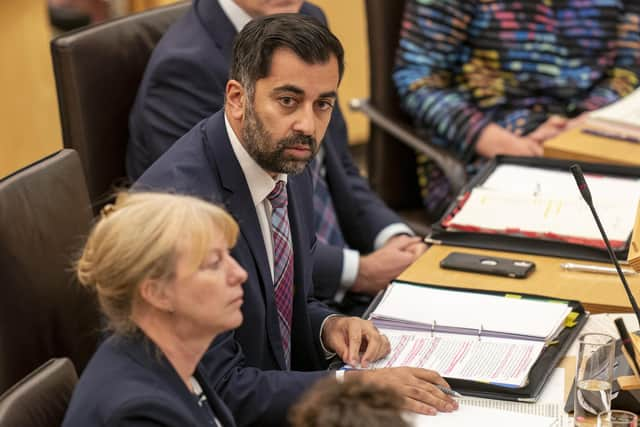WhatsApp message row: Why does the row over Jason Leitch and Covid WhatsApps matter and what does it tell us about the Scottish Government?
Around 70 witnesses, potentially including Nicola Sturgeon, Humza Yousaf, Jeane Freeman, John Swinney and key backroom officials, were involved in around 137 WhatsApp or other instant messaging groups during the Covid-19 pandemic.
Not one message, however, has been forthcoming from the Scottish Government. In fact, the “majority” of messages have not been retained by those at the centre of the Government’s decision making during Covid-19.
Advertisement
Hide AdAdvertisement
Hide AdThis is an astonishing, but predictable outcome of years of failure of government to adequately ensure its record keeping is fit for the modern age.


These messages do matter. Yes, there will be the hope from journalists – me included – they will include juicy examples of friendly fire where senior advisers bemoan colleagues, or are shown to be playing politics amid a national emergency.
But the central problem is that if the inquiry does not have access to these messages, we will never be able to fully interrogate why certain decisions were made and what was going through the heads of those who ran the country during a world-changing pandemic.
We do not know, yet, whether deleted material includes conversations between Ms Sturgeon and her two health secretaries during the pandemic, Ms Freeman and Mr Yousaf, or whether Gregor Smith, the chief medical officer, made representations in these groups which were then ignored by politicians.
All of this integrally important information is potentially gone, replaced by unenlightening, civil service speak acknowledgements of decisions made. We all know those do not capture the truth of what happens in government.
In fact, in any modern company or organisation, decisions are taken often with the benefit of hours of informal back-and-forth over instant messaging services. Think, for a moment, how often you speak to your boss or colleague over Microsoft Teams, or Google Chat, Slack, or WhatsApp.
There are also questions about their use in public agencies such as Public Health Scotland, which has disclosed some WhatsApps, and the National Records of Scotland – two bodies which have demonstrated their ability to be manipulated by ministers despite their prima facie independence.
The true reasons for decisions made will be lost with the messages. That is scandalous.
Advertisement
Hide AdAdvertisement
Hide AdIn addition, the inquiry said it is asking for details of the policies abided by those involved in the Government’s Covid response when it comes to WhatsApp.
It will be interesting to see the Government’s position and whether it changes, if only to clarify whether it’s approach to Freedom of Information requests truly holds water.
Under existing policy, according to the government, retention of WhatsApps is a matter of personal judgement as to whether they relate to government business or are about decision making.
If they do, this is then recorded electronically, but not by retaining the message itself. Instead a record of the decision, not the context or a screenshot, is kept. The medium in which it was made is lost to history. This approach, in a modern world, is deliberately unsatisfactory.
It allows for informal discussions, the like of which happen over the phone regularly and face-to-face constantly, to go unmonitored. During a pandemic, however, those opportunities are lessened, the stakes higher, and the use of instant messaging exploded as work from home became mandatory.
If it was Scottish Government policy, even informally, to regularly delete instant messaging or make use of auto-delete functions, that will be a scandal and one which could topple the First Minister.
It will be overwhelming evidence of a desire for secrecy, a rejection of transparency and accountability, and an active attempt to cover-up the truth of those dark spring days in 2020.
In 2021, The Scotsman reported that remote working guidance instructed officials and ministers to delete information “where it has no value”.
Advertisement
Hide AdAdvertisement
Hide AdScotland’s information watchdog raised concerns there was no “specific policy” in regards to SMS and WhatsApp messages, which “may be being created and deleted on a daily basis, with no back-up services in place to record such information”.
This, it was said, could pose problems for those trying to access WhatsApp via FOI or other legal routes.
Lo and behold, a year later The Scotsman revealed six ministers, including Mr Yousaf, used WhatsApp for government business.
Where were the messages? Too expensive to find.
The inquiry having similar problems is no surprise, and is demonstrative of a suffocating culture of secrecy within Bute House.
Comments
Want to join the conversation? Please or to comment on this article.
